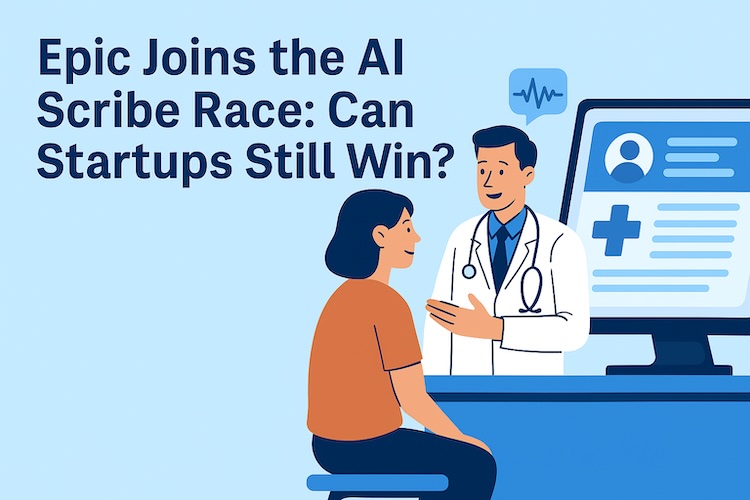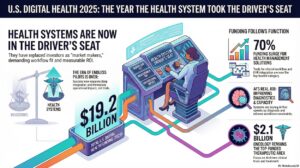The entry of the electronic health record giant into the ambient scribe market marks a turning point—but does it spell the end for startups, or the beginning of a more innovative era?
TL;DR
- Epic has launched its own AI-powered medical scribe, a move CIOs have called a “watershed moment.”
- Oracle has countered with an “AI-first” electronic health record, signalling a new arms race in clinical documentation.
- Nuance (Microsoft) and Abridge have until now defined the category, with Abridge raising $550 million in 2025 alone.
- Other startups—including Corti, Augmedix and Insight Health—face both new challenges and new opportunities.
- Competition from incumbents will reshape the landscape, but innovation will still come from startups, either through direct competition or eventual acquisition.
A Watershed Moment for Clinical Documentation
When Becker’s Health IT reported that Epic Systems had launched its own ambient AI scribe earlier this summer, the story reverberated across the US health system1. One chief information officer quoted described the event as nothing less than a “watershed moment.” The comment was not hyperbolic. Epic, the undisputed leader in the US electronic health record (EHR) market, has for years set the pace of digital healthcare adoption. Its decision to roll out a proprietary scribe solution sends an unmistakable signal: AI-powered documentation is no longer an experimental add-on, but a core feature of the modern health record.
This move places Epic directly into competition with both Big Tech and well-funded startups. Microsoft’s Nuance, with its Dragon Ambient eXperience, has been the de facto incumbent in the category. Meanwhile, Abridge—the most significant private challenger—has spent 2025 in a fundraising frenzy, securing a staggering $550 million across two rounds. That funding underwrites rapid deployment across blue-chip health systems, including Memorial Sloan Kettering, Kaiser Permanente, Mayo Clinic and UNC Health.
The implications of Epic’s decision are profound: not only does it validate the market for AI scribes, but it also sets the tone for a new competitive landscape in which scale, speed, and trust are all up for grabs.
Oracle Strikes Back
Epic’s announcement did not occur in a vacuum. In parallel, Oracle Health has been attempting to carve out its own new niche with what Fierce Healthcare reported as an “AI-first” electronic health record2. Oracle’s ambition is not merely to graft AI onto existing workflows, but to reimagine the very infrastructure of the EHR.
If Epic’s move was an assertion of dominance, Oracle’s was an act of defiance. Both companies now find themselves positioning AI as the next battleground for system-wide adoption, a high-stakes contest that will determine who controls the physician’s daily digital environment. With health systems exhausted by years of interoperability battles, both players are framing ambient scribing not just as a convenience, but as a path to clinician relief, improved patient engagement, and ultimately retention of market share.
The Startup Dilemma
Against this backdrop, what becomes of the startups? On one hand, the market has never been more validated. Abridge, Corti, Augmedix and Insight Health can now point to Epic’s and Oracle’s commitments as proof of the sector’s inevitability. On the other hand, the noise of big-brand competition risks crowding out smaller ventures still building credibility and scale.
For investors, this creates both opportunity and hazard. The wave of funding flowing into Abridge suggests capital is willing to back clear winners in the category, particularly those that can demonstrate operational integration within Tier 1 health systems. Yet for less mature ventures, the path ahead is treacherous. With Epic entering the market, many CIOs will naturally ask: why experiment with an independent tool when the EHR vendor now offers its own built-in solution?
This is the paradox of startup innovation in healthcare IT: the more successful the category becomes, the more incumbents are incentivised to close ranks.
Why Competition Will Drive Innovation
And yet, to declare the market over would be to misunderstand the dynamics of healthcare technology. History has shown—repeatedly—that the most transformative ideas rarely originate within the incumbents themselves. They are tested, refined, and proven by startups, which then either survive independently, are acquired, or inspire copycats within the portfolios of the larger vendors.
Nuance may have brought Microsoft scale, but it was an independent innovator long before the acquisition. Abridge, with its deep learning approach to contextual clinical conversation, has proven the value of specialist focus. And new entrants such as Corti, with its emphasis on real-time triage and decision support, are broadening the definition of what “ambient” means in practice.
In this sense, Epic’s scribe launch is not the end of startup innovation but a catalyst for its next phase. By validating demand, Epic and Oracle ensure that venture capital continues to flow, while also raising the bar for quality and usability.
What’s at Stake for Industry, Investors and Startups
For the Health Systems
Clinicians have long complained of “death by clicks.” Ambient scribing, if widely deployed, has the potential to give back the most precious resource in healthcare: time. Epic’s and Oracle’s moves mean that health systems will soon be forced to choose not whether to adopt an AI scribe, but whose. The risk is further strengthening the (already excessive) dependence on the world’s most-used EHR ; the opportunity is clinician relief and productivity gains.
For Investors
The sector has shifted from speculative to strategic. With Abridge’s $550 million raise as a benchmark, there is clearly an appetite for late-stage bets. But the widening moat around Epic means that investors in earlier-stage ventures must be more selective, seeking either technological differentiation or niche deployment models that can withstand the gravitational pull of the EHR giants.
For Startups
The path forward is narrower but clearer. Startups will need to stand apart through true technological differentiation or by targeting niche deployment models resilient to the gravitational pull of the EHR giants. Seamless integration with health systems remains essential, but forging partnerships with insurers, telehealth platforms and life sciences firms could open alternative pathways to scale.
The Waning of the AI Hype Cycle
There is also a sobering backdrop. MIT’s recent report on the state of AI by the NANDA initiative reveals that the initial euphoria surrounding generative AI is beginning to wane3. It is time for investors to scrutinise revenue models, adoption curves and regulatory exposure more closely. For startups in the ambient scribe market, Epic’s entry both validates the category and raises the barrier to survival. Those with real traction—Abridge foremost among them—will continue to thrive. Those with weaker fundamentals may not weather the storm.
The market is becoming crowded, but crowding itself is not fatal. It is the spur that pushes innovation forward, culling weaker offerings and rewarding those that can genuinely reduce clinician burden.
Conclusion
Epic’s announcement is undeniably historic: a market once defined by startups and niche providers is now centre stage in the strategy of the largest EHR vendor in the United States. Yet the story is not one of displacement, but of evolution. As with every wave of digital health, the real innovation will continue to come from the edges of the market—from startups willing to experiment, iterate and challenge assumptions.
Epic has placed its bet. Oracle has done the same. But it is the restless creativity of smaller ventures that will determine whether AI scribes truly transform healthcare—or merely add another layer of complexity to a system already groaning under the weight of digital bureaucracy.
Frequently Asked Questions
Is Epic’s entry the end for startups in the AI scribe space?
No. While Epic’s move raises the stakes, startups remain critical drivers of innovation. Many will be acquired, partnered with, or inspire product development within the incumbents.
What makes Abridge different from other startups?
Abridge combines deep AI expertise with proven adoption in major health systems. Its recent $550 million in funding demonstrates investor confidence and positions it as the leading private challenger.
How does Oracle’s “AI-first” EHR compare to Epic’s scribe?
Oracle is attempting to embed AI across the entire EHR infrastructure, whereas Epic’s focus has been on ambient documentation as a key feature. Both approaches reflect different philosophies of digital transformation.
Will clinicians actually embrace AI scribes?
Evidence suggests yes, provided they are accurate, reliable and well-integrated. CIOs are already framing Epic’s move as a milestone, underscoring latent demand across health systems.
Which startups should investors watch next?
Beyond Abridge, Corti, Augmedix and Insight Health are notable players, each pursuing differentiated approaches to clinical documentation and support.
References
- Diaz, N. (2025, August 12). ‘A watershed moment’: CIOs react to Epic’s AI scribe launch. Becker’s Hospital Review. https://www.beckershospitalreview.com/healthcare-information-technology/ai/a-watershed-moment-cios-react-to-epics-ai-scribe-launch
- Landi, H. (2025, August 13). Oracle Health launches new ‘AI-first’ electronic health record. Fierce Healthcare. https://www.fiercehealthcare.com/health-tech/oracle-health-debuts-ai-powered-ehr-designed-voice-first-solution-embedded-agentic-ai
- The GenAI Divide: State of AI in Business 2025, MIT’s NANDA initiative








